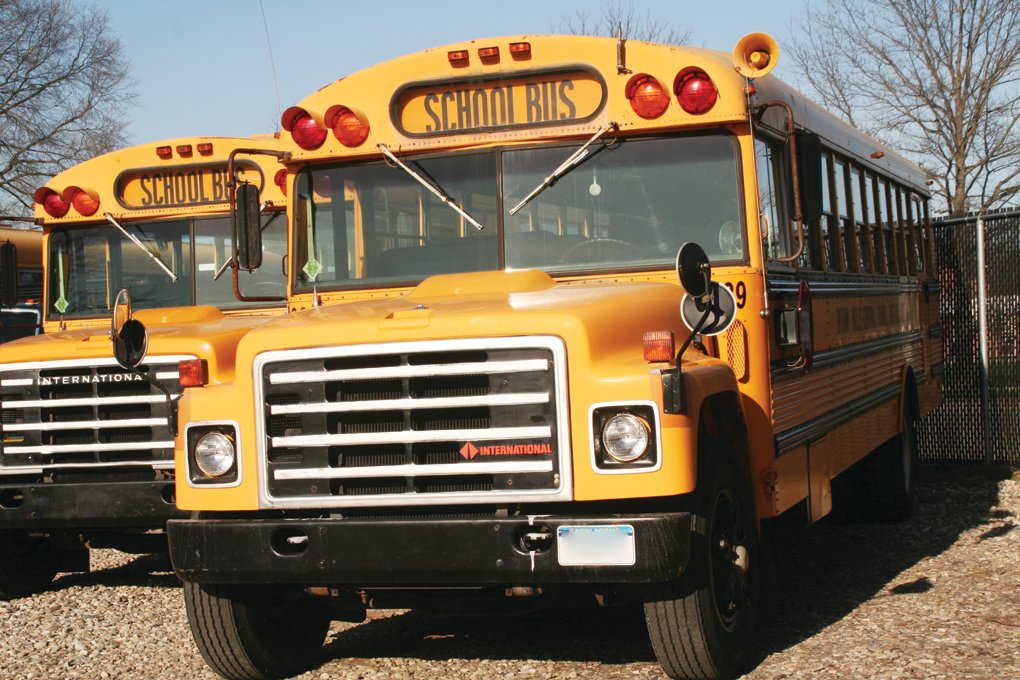E.M. leads the way in bus safety
Pilot school program to use cameras on stop-arms
All seven members of the East Meadow Board of Education recently voted in favor of bolstering bus safety with a 30-day pilot program aimed at preventing vehicles from illegally passing school buses when their stop-arms are extended.
Before the end of the school year, the East Meadow School District will be the first on Long Island to launch the program through a partnership with Bus Patrol America, a safety technology company based in Lorton, Va.
The district will equip 12 of its 60 buses with cameras that will live-stream the activity around them. After 30 days, school board Trustee Eileen Napolitano explained, district officials will review the footage to determine how often drivers are passing stopped, red-light-flashing buses and where it is happening most often.
Passing a stopped school bus is illegal, and punishable by a ticket of $250 to $400, five points on your license and up to 30 days in jail. A police officer must witness the infraction to enforce the law, which poses difficulties because of how often it occurs. According to data collected by the New York Association for Pupil Transportation, 50,000 cars illegally pass buses every day in New York state.
There will be no tickets issued to drivers during the pilot period, according to district officials. Instead, the district will use the information to determine what safety measures it will pursue going forward, such as placing crossing guards at the intersections with the most infractions.
A friend of Napolitano’s recommended the program to her, and she said that after she consulted with her colleagues on the board and contacted Bus Patrol America, there was agreement that the partnership was a natural fit.
East Meadow has earned a reputation for being a pioneer in the use of the latest safety measures. This year, for example, the district instituted an identification system that provides all staff and students with ID cards that they are required to show when they enter its buildings.
Napolitano described the pilot program as a “no-brainer,” and added that Bus Patrol America would provide the software for free. “I just think that it’s another opportunity for us to have another layer of security and safety for students,” she said.
Bus Patrol America has partnered with over 4,000 bus companies across the country in the past month alone, according to Dave Poirier, the company’s president. “There are a lot of bus stops on busy roads, and there aren’t enough police to enforce the law,” he said. “So people think they can pass school buses and they don’t have to stop.”
Poirier founded the company because he wanted to protect his own children, he said, adding that there is a bus stop in front of his Virginia home, and he regularly sees vehicles disregarding the law by passing stopped buses.
When the issue was addressed on the East Meadow Moms Facebook page, many took to the comment section to show their support for the program and voice their concerns about the issue. Many shared stories about vehicles driving past stopped buses in front of their homes, to which they reacted by calling the local precinct or stopping the cars themselves to reprimand their drivers. Neither action had much of an impact, however.
Napolitano answered residents’ questions on the site, addressing one who asked why police enforcement couldn’t be bolstered along all bus routes. “When we pull a car from patrolling the area, it can leave us vulnerable,” she wrote. “Our district is big. And at any time we can have as few as two or three cars. Same goes when crossing guards, call in sick. Police need to respond. I’m hopeful we can get more crossing guards and this program will be successful.”
While East Meadow’s pilot program will be permitted only for data-collection purposes, Gov. Andrew Cuomo announced in January that he supported the creation of a law that would allow districts to permanently install the cameras as a means of issuing fines. Cuomo said in a statement that he would propose the measure, in addition to an increase in fines, in his 2020 budget.
The law, named the School Bus Camera Safety Act, passed in the State Assembly in March and is now being considered by the State Senate’s Transportation Committee.

 49.0°,
Fair
49.0°,
Fair 




